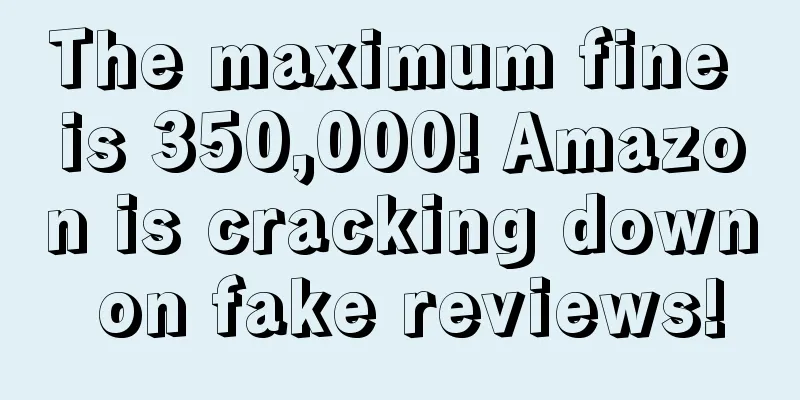The maximum fine is 350,000! Amazon is cracking down on fake reviews!

|
As we all know, Amazon has always had zero tolerance for fake reviews. Now it is not limited to the platform. This year, it has teamed up with Google and the Federal Trade Commission (FTC) to crack down on fake reviews! These actions show that fake review practices are being cracked down on more strictly and sellers face greater challenges in maintaining their brand reputation and customer trust. Some cross-border e-commerce sellers may know that the FTC proposed a policy against fake reviews in 2022. According to the latest news, the final rules of the policy have now been finalized. The new regulations clearly prohibit the creation, purchase or sale of false reviews. Violators may be fined up to US$50,000 (approximately RMB 350,000) each time! The new rule, titled "Final Trade Regulatory Rule Regarding the Use of Consumer Reviews and Testimonials," will take effect 60 days after being published in the U.S. Federal Register. The rules prohibit details as follows: 1. False or misleading consumer reviews, consumer testimonials, and celebrity testimonials: This includes using artificial intelligence to generate fake reviews; hiring people to write reviews who have not actually used your product or service; and misrepresenting the buyer’s real experience. Sellers also cannot purchase fake reviews or obtain fake reviews from company insiders. 2. Prohibition on purchasing positive or negative reviews: Sellers are prohibited from using any form of compensation or reward in exchange for buyers writing reviews with specific emotions, whether positive or negative. In other words, you cannot pay someone to write a good review for you, nor can you pay someone to write a bad review for your competitors. 3. Prohibition of internal reviews and consumer recommendations : Internal employees of a company are prohibited from writing or publishing reviews or recommendations of products or services without clearly disclosing their relationship with the company. At the same time, the rule prohibits officials, managers, and agents from making similar reviews and recommendations. 4. Fraudulently Claiming that Company-Controlled Review Sites Are Independent : The final rule prohibits a business from falsely representing that a website or entity it controls provides independent reviews or opinions about products or services, including its own products or services. 5. Blocking negative reviews is prohibited: Sellers are prohibited from using any improper means ( unreasonable legal threats, personal threats, intimidation or public false accusations ) to block or delete negative reviews. In addition, sellers cannot falsely claim that the reviews on the website represent the opinions of all or most buyers after blocking negative reviews. 6. Prohibition of abuse of false social media indicators: This rule prohibits anyone from selling or buying false social media influence indicators, such as followers or views generated by robots or hijacked accounts. If you know that these indicators are false and use them to mislead buyers, you may also be punished. In the United States, the Federal Trade Commission (FTC) requires that advertising must be truthful, which means that any form of fake orders must disclose the economic interests behind it. Sellers need to be aware of the legal risks that fake orders and false reviews may bring! In short, this time the FTC's final rules are aimed at combating false reviews and abuses, protecting consumer interests and maintaining fair competition in the market. Companies need to pay attention to these regulations and ensure that their actions meet compliance requirements to avoid legal risks and reputational damage. In recent years, Amazon has been cracking down on those who violate its policies, including suspensions, bans, or legal actions. In 2024, Amazon has further increased its efforts to crack down on such violations. > Amazon and Google file new lawsuit against fake review sites On October 28, according to foreign media reports, Amazon and Google filed lawsuits in federal court against a man and Bigboostup, a website he controlled that posted fake reviews, accusing the website of facilitating false product and business reviews against Amazon and Google and selling false reviews to bad merchants to post on Amazon stores, Google searches, and Google Maps. > Amazon wins first lawsuit against fake orders and fake reputation, and wins a great victory in the final trial Recently, the first domestic case of Amazon fake orders and fake reputation unfair competition has entered the second instance, and the Shenzhen Intermediate People's Court has made a final judgment: rejecting the defendant's appeal and upholding the first instance judgment. The first instance determined that the defendant's service provider had indeed violated the relevant provisions of the Anti-Unfair Competition Law, and ordered the defendant to make a public statement to eliminate the impact and compensate Amazon for economic losses and reasonable expenses totaling 800,000 yuan. >Amazon and Better Business Bureau jointly sue In July, Amazon and the Better Business Bureau jointly filed a joint lawsuit against the violating operator ReviewServiceUSA.com, accusing it of selling fake reviews to violating operators on Amazon product pages and Better Business Bureau profiles. Amazon pointed out that consumers rely heavily on product reviews when making purchasing decisions, and false product reviews and feedback will seriously damage the trust of customers, sellers and manufacturers in the platform, thereby damaging Amazon's brand image. In addition to confronting illegal activities, on the technical level, Amazon uses advanced monitoring systems and algorithms to monitor comments on the platform in real time to ensure that only real user experiences are published. Amazon is also trying to nip fake orders and reputation manipulation in the bud by spot-checking store accounts and launching artificial intelligence tools. It can be said that any attempt to manipulate reviews will be strictly scrutinized and dealt with. For sellers, Amazon's continued crackdown on false reviews should serve as a reminder that false reviews can only bring temporary benefits. In a healthy and upward market environment, such behavior will never be exposed. Sellers should still adhere to the bottom line of legal operations to avoid becoming the target of the platform's crackdown and ultimately losing both the wife and the army. |
Recommend
What is uShip? uShip Review
uShip is an electronic freight marketplace founded...
Crazy! Lottery booking! Hard to get a box! Hard to get a cabin! Hard, hard, hard!
It's hard to get a box! It's hard to get ...
What is TNT Express? TNT Express Review
TNT Express provides express and postal services t...
What are PopSockets? PopSockets Review
Popsockets is a brand of mobile phone airbag holde...
Amazon banned your product for variant violation? Let’s find out more about variants!
There are more and more cases of sellers having th...
What is Huahan Logistics? Huahan Logistics Review
Shenzhen Huahan Hongyun International Freight Forw...
What is Fotki? Fotki Review
Fotki is a social networking site and web service ...
Insulting China T-shirts were found on Amazon’s own products, and sellers collectively condemned it!
Amazon's own stores have been at the center of...
US retail market forecast for 2023! These four major events are worth paying attention to
It is learned that with the arrival of 2023, eMark...
What is Amazon Smile Logo Infringement? Amazon Smile Logo Infringement Review
Amazon's logo is a smiley face with an arrow p...
Directly waive FBA storage fees! Amazon's welfare policy will be extended to next year
Generally speaking, in order to prevent mistakes ...
What is Blisby? Blisby Review
Blisby was founded in November 2013. It is a Thai ...
What is Enjoy Overseas? Enjoy Overseas Review
EnjoyGoGo is a mobile developer overseas service p...
Best Buy's profit in Q2 was cut in half! Sales of most categories dropped sharply! Q3 outlook is not optimistic!
It is learned that Best Buy released its Q2 financ...
What is Lazada? Lazada Review
Lazada was founded in Singapore in 2012 by Rocket ...









